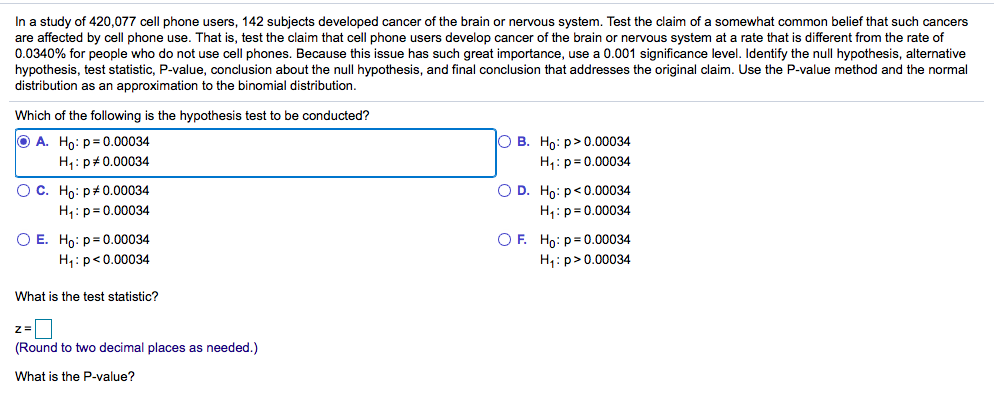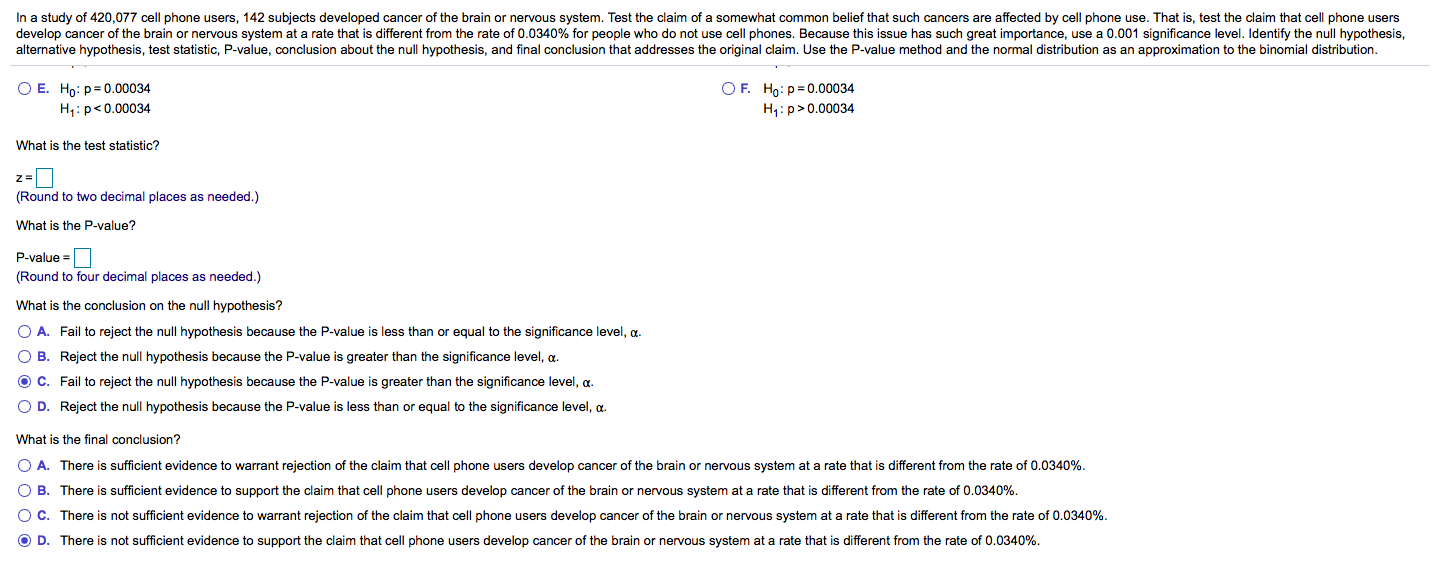In a study of 420,077 cell phone users, 142 subjects developed cancer of the brain or nervous system. Test the claim of a somewhat common belief that such cancers are affected by cell phone use. That is, test the claim that cell phone users develop cancer of the brain or nervous system at a rate that is different from the rate of 0.0340% for people who do not use cell phones. Because this issue has such great importance, use a 0.001 significance level. Identify the null hypothesis, alternative hypothesis, test statistic, P-value, conclusion about the null hypothesis, and final conclusion that addresses the original claim. Use the P-value method and the normal distribution as an approximation to the binomial distribution. Which of the following is the hypothesis test to be conducted? O A. Ho: p= 0.00034 H;: p#0.00034 O B. Ho: p> 0.00034 H: p= 0.00034 OC. Ho: p#0.00034 H,: p= 0.00034 O D. Ho: p< 0.00034 H: p= 0.00034 O E. Ho: p=0.00034 H:p<0.00034 OF. Ho: p= 0.00034 H1: p>0.00034 What is the test statistic? z= (Round to two decimal places as needed.) What is the P-value? In a study of 420,077 cell phone users, 142 subjects developed cancer of the brain or nervous system. Test the claim of a somewhat common belief that such cancers are affected by cell phone use. That is, test the claim that cell phone users develop cancer of the brain or nervous system at a rate that is different from the rate of 0.0340% for people who do not use cell phones. Because this issue has such great importance, use a 0.001 significance level. Identify the null hypothesis, alternative hypothesis, test statistic, P-value, conclusion about the null hypothesis, and final conclusion that addresses the original claim. Use the P-value method and the normal distribution as an approximation to the binomial distribution. O E. Ho: p= 0.00034 OF. Ho: p= 0.00034 H,:p<0.00034 H4:p>0.00034 What is the test statistic? z=D (Round to two decimal places as needed.) What is the P-value? P-value = (Round to four decimal places as needed.) What is the conclusion on the null hypothesis? O A. Fail to reject the null hypothesis because the P-value is less than or equal to the significance level, a. O B. Reject the null hypothesis because the P-value is greater than the significance level, a. O C. Fail to reject the null hypothesis because the P-value is greater than the significance level, a. O D. Reject the null hypothesis because the P-value is less than or equal to the significance level, a. What is the final conclusion? O A. There is sufficient evidence to warrant rejection of the claim that cell phone users develop cancer of the brain or nervous system at a rate that is different from the rate of 0.0340%. O B. There is sufficient evidence to support the claim that cell phone users develop cancer of the brain or nervous system at a rate that is different from the rate of 0.0340%. O C. There is not sufficient evidence to warrant rejection of the claim that cell phone users develop cancer of the brain or nervous system at a rate that is different from the rate of 0.0340%. O D. There is not sufficient evidence to support the claim that cell phone users develop cancer of the brain or nervous system at a rate that is different from the rate of 0.0340%.
In a study of 420,077 cell phone users, 142 subjects developed cancer of the brain or nervous system. Test the claim of a somewhat common belief that such cancers are affected by cell phone use. That is, test the claim that cell phone users develop cancer of the brain or nervous system at a rate that is different from the rate of 0.0340% for people who do not use cell phones. Because this issue has such great importance, use a 0.001 significance level. Identify the null hypothesis, alternative hypothesis, test statistic, P-value, conclusion about the null hypothesis, and final conclusion that addresses the original claim. Use the P-value method and the normal distribution as an approximation to the binomial distribution. Which of the following is the hypothesis test to be conducted? O A. Ho: p= 0.00034 H;: p#0.00034 O B. Ho: p> 0.00034 H: p= 0.00034 OC. Ho: p#0.00034 H,: p= 0.00034 O D. Ho: p< 0.00034 H: p= 0.00034 O E. Ho: p=0.00034 H:p<0.00034 OF. Ho: p= 0.00034 H1: p>0.00034 What is the test statistic? z= (Round to two decimal places as needed.) What is the P-value? In a study of 420,077 cell phone users, 142 subjects developed cancer of the brain or nervous system. Test the claim of a somewhat common belief that such cancers are affected by cell phone use. That is, test the claim that cell phone users develop cancer of the brain or nervous system at a rate that is different from the rate of 0.0340% for people who do not use cell phones. Because this issue has such great importance, use a 0.001 significance level. Identify the null hypothesis, alternative hypothesis, test statistic, P-value, conclusion about the null hypothesis, and final conclusion that addresses the original claim. Use the P-value method and the normal distribution as an approximation to the binomial distribution. O E. Ho: p= 0.00034 OF. Ho: p= 0.00034 H,:p<0.00034 H4:p>0.00034 What is the test statistic? z=D (Round to two decimal places as needed.) What is the P-value? P-value = (Round to four decimal places as needed.) What is the conclusion on the null hypothesis? O A. Fail to reject the null hypothesis because the P-value is less than or equal to the significance level, a. O B. Reject the null hypothesis because the P-value is greater than the significance level, a. O C. Fail to reject the null hypothesis because the P-value is greater than the significance level, a. O D. Reject the null hypothesis because the P-value is less than or equal to the significance level, a. What is the final conclusion? O A. There is sufficient evidence to warrant rejection of the claim that cell phone users develop cancer of the brain or nervous system at a rate that is different from the rate of 0.0340%. O B. There is sufficient evidence to support the claim that cell phone users develop cancer of the brain or nervous system at a rate that is different from the rate of 0.0340%. O C. There is not sufficient evidence to warrant rejection of the claim that cell phone users develop cancer of the brain or nervous system at a rate that is different from the rate of 0.0340%. O D. There is not sufficient evidence to support the claim that cell phone users develop cancer of the brain or nervous system at a rate that is different from the rate of 0.0340%.
College Algebra (MindTap Course List)
12th Edition
ISBN:9781305652231
Author:R. David Gustafson, Jeff Hughes
Publisher:R. David Gustafson, Jeff Hughes
Chapter8: Sequences, Series, And Probability
Section8.7: Probability
Problem 58E: What is meant by the sample space of an experiment?
Related questions
Question

Transcribed Image Text:In a study of 420,077 cell phone users, 142 subjects developed cancer of the brain or nervous system. Test the claim of a somewhat common belief that such cancers
are affected by cell phone use. That is, test the claim that cell phone users develop cancer of the brain or nervous system at a rate that is different from the rate of
0.0340% for people who do not use cell phones. Because this issue has such great importance, use a 0.001 significance level. Identify the null hypothesis, alternative
hypothesis, test statistic, P-value, conclusion about the null hypothesis, and final conclusion that addresses the original claim. Use the P-value method and the normal
distribution as an approximation to the binomial distribution.
Which of the following is the hypothesis test to be conducted?
O A. Ho: p= 0.00034
H;: p#0.00034
O B. Ho: p> 0.00034
H: p= 0.00034
OC. Ho: p#0.00034
H,: p= 0.00034
O D. Ho: p< 0.00034
H: p= 0.00034
O E. Ho: p=0.00034
H:p<0.00034
OF. Ho: p= 0.00034
H1: p>0.00034
What is the test statistic?
z=
(Round to two decimal places as needed.)
What is the P-value?

Transcribed Image Text:In a study of 420,077 cell phone users, 142 subjects developed cancer of the brain or nervous system. Test the claim of a somewhat common belief that such cancers are affected by cell phone use. That is, test the claim that cell phone users
develop cancer of the brain or nervous system at a rate that is different from the rate of 0.0340% for people who do not use cell phones. Because this issue has such great importance, use a 0.001 significance level. Identify the null hypothesis,
alternative hypothesis, test statistic, P-value, conclusion about the null hypothesis, and final conclusion that addresses the original claim. Use the P-value method and the normal distribution as an approximation to the binomial distribution.
O E. Ho: p= 0.00034
OF. Ho: p= 0.00034
H,:p<0.00034
H4:p>0.00034
What is the test statistic?
z=D
(Round to two decimal places as needed.)
What is the P-value?
P-value =
(Round to four decimal places as needed.)
What is the conclusion on the null hypothesis?
O A. Fail to reject the null hypothesis because the P-value is less than or equal to the significance level, a.
O B. Reject the null hypothesis because the P-value is greater than the significance level, a.
O C. Fail to reject the null hypothesis because the P-value is greater than the significance level, a.
O D. Reject the null hypothesis because the P-value is less than or equal to the significance level, a.
What is the final conclusion?
O A. There is sufficient evidence to warrant rejection of the claim that cell phone users develop cancer of the brain or nervous system at a rate that is different from the rate of 0.0340%.
O B. There is sufficient evidence to support the claim that cell phone users develop cancer of the brain or nervous system at a rate that is different from the rate of 0.0340%.
O C. There is not sufficient evidence to warrant rejection of the claim that cell phone users develop cancer of the brain or nervous system at a rate that is different from the rate of 0.0340%.
O D. There is not sufficient evidence to support the claim that cell phone users develop cancer of the brain or nervous system at a rate that is different from the rate of 0.0340%.
Expert Solution
This question has been solved!
Explore an expertly crafted, step-by-step solution for a thorough understanding of key concepts.
This is a popular solution!
Trending now
This is a popular solution!
Step by step
Solved in 6 steps with 2 images

Recommended textbooks for you

College Algebra (MindTap Course List)
Algebra
ISBN:
9781305652231
Author:
R. David Gustafson, Jeff Hughes
Publisher:
Cengage Learning

College Algebra (MindTap Course List)
Algebra
ISBN:
9781305652231
Author:
R. David Gustafson, Jeff Hughes
Publisher:
Cengage Learning